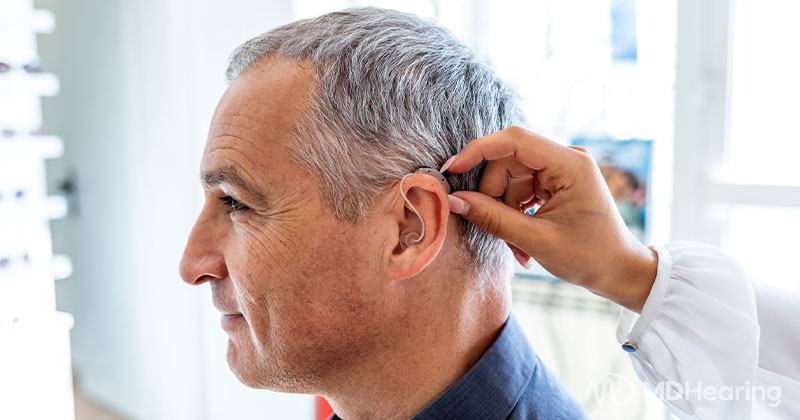It's natural to worry that buying new hearing aids will worsen your hearing loss. You may have even heard people say they have a more challenging time hearing without their hearing aids than before they started using them. In reality, it’s a matter of perception—their brains are merely tricking them.
If you think hearing aids will make your hearing worse, think again. That's a myth, so let us set the record straight for you.
How hearing aids affect the ears and brain
You may have heard the phrase “use it or lose it,” meaning your nerves (including those in your ears) need stimulation to stay healthy. When you have age-related hearing loss or some other cause of hearing loss, your auditory nerve cells are being underused, which can cause them to weaken. Plus, your brain works harder to hear sounds due to less information from those damaged or weakened nerves. The combination of these two issues leads to further hearing loss.
Unaddressed hearing loss can impact your health in many ways, from brain atrophy and dementia to balance issues and increased risk of falls. Fortunately, most people with hearing loss can reduce these risks by wearing hearing aids.
Do hearing aids make hearing worse?
If you have new hearing devices or are considering buying some, you might ask: “Will my hearing aids cause hearing loss?” Under most circumstances, the answer is no.
Keep in mind, though, that hearing loss can be caused by prolonged exposure to loud noises at 85 decibels and above. If your hearing aids are incorrectly programmed to make noises much louder than you need, it could cause additional damage to your ears. However, hearing aids that are programmed correctly, fit well, and filter sounds properly, shouldn't damage your hearing.
Why is it harder to hear after wearing hearing aids?
If you have new hearing aids and it seems your hearing has worsened, fret not. Prior to wearing hearing aids, your hearing loss likely progressed gradually. In the process, your brain got used to hearing fewer sounds and straining to discern conversation. Subsequently, it perceives this level of hearing as “normal.”
However, when you begin wearing hearing aids, your brain receives new information it hasn't experienced in a while. It has to adjust to recognize this as the “new normal.” As a result, trying to hear without hearing aids may seem like it's worse than it was before because your hearing loss has become more noticeable.
What is this "new normal" all about?
Let's consider how your body senses temperature. For example, say you’ve been at the beach all day in 90-degree weather. When you go back inside, your 70-degree home feels chilly. That's because your body has adjusted to consider 90 degrees as normal. On the other hand, when you're outside shoveling snow, your body adjusts to the 30-degree temperature and then your 70-degree home feels warm. The room temperature in question hasn’t changed, but your perceptions have.
In the same way, when you first start wearing hearing aids, your brain learns to take in the new information it's receiving. When you take off your hearing aids after being able to hear the "new normal," your hearing loss becomes more noticeable. Your hearing may seem muted and diminished without your devices. It already was; you merely notice it more because you’ve been experiencing better hearing with your new hearing aids.
Can hearing aids slow or stop hearing loss?
Now that you know hearing aids don't worsen hearing loss, you may question whether they can slow or stop it. You'll be pleased to learn that hearing aids can slow the progression of your hearing loss, though they can't restore normal hearing.
Hearing aids amplify sounds you struggle to hear otherwise, and they keep your auditory nerves stimulated and "exercised." When you consistently use your hearing aids, your brain maintains the optimal ability to comprehend sound under your current hearing loss condition. It also boosts your quality of life, including your physical and mental health.
Reap the benefits of hearing aids
There are many myths about hearing aids, so fact-checking is essential when nearly 30 million American adults have hearing loss. It's natural to feel like your hearing is worse when you take your hearing aids off. Hearing aids keep your nerves stimulated and healthy, often preventing further hearing loss. When buying hearing aids, ensure they're programmed correctly so that you don’t cause further damage to your ears.
At MDHearing, we cut out the middleman and ship our affordable OTC hearing aids directly to your door—without any appointments or hearing clinic visits required. MDHearing follows all of the FDA guidance regarding specifications and sound levels, so you can be assured that our hearing aids are safe to use. Our team of licensed audiologists and hearing specialists is here to answer any questions you may have. Check out our line of FDA-registered hearing aids and order yours today!
Want to see if MDHearingAid hearing aids will work for you? Take our quick and easy online hearing test and get your results instantly.
TAKE ONLINE HEARING TEST
